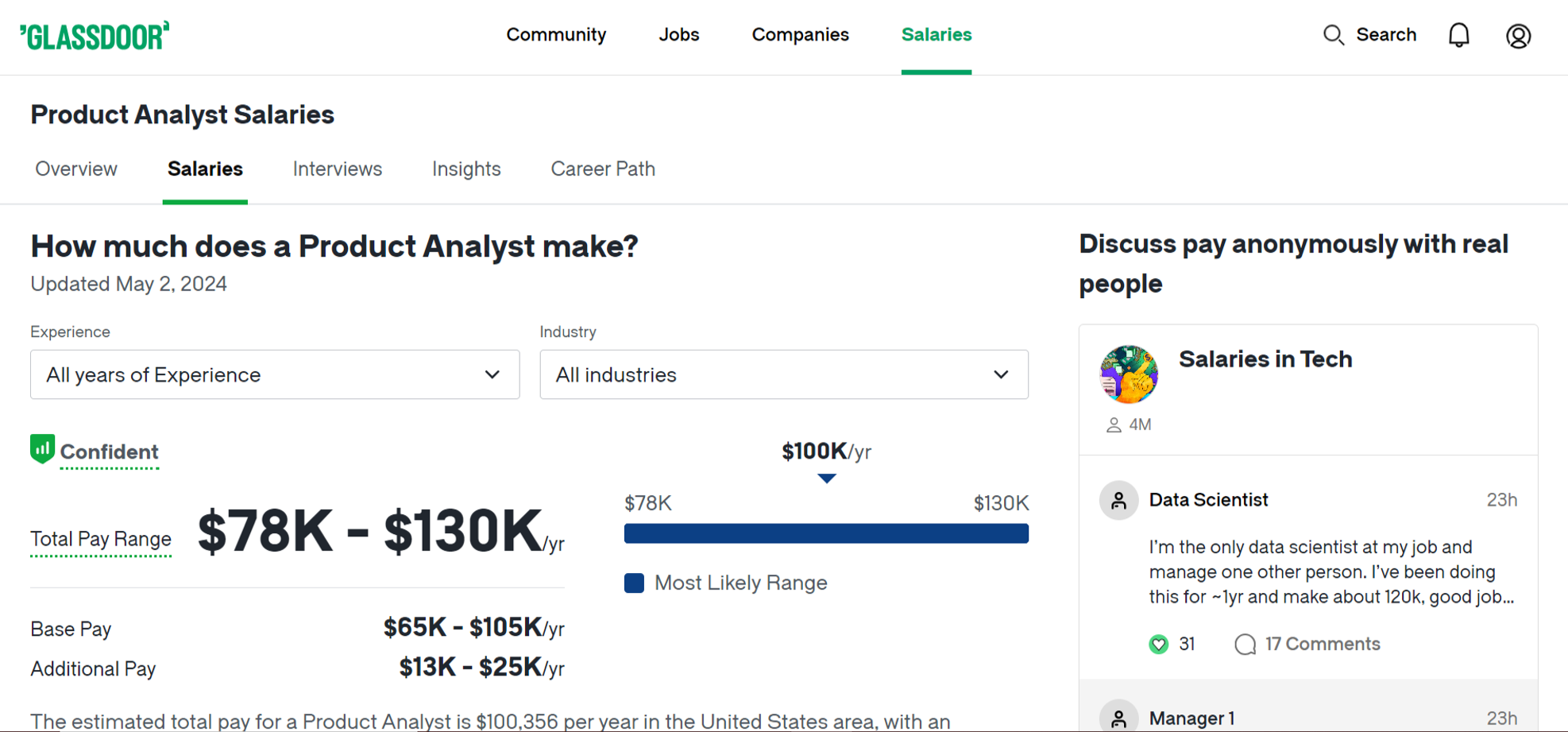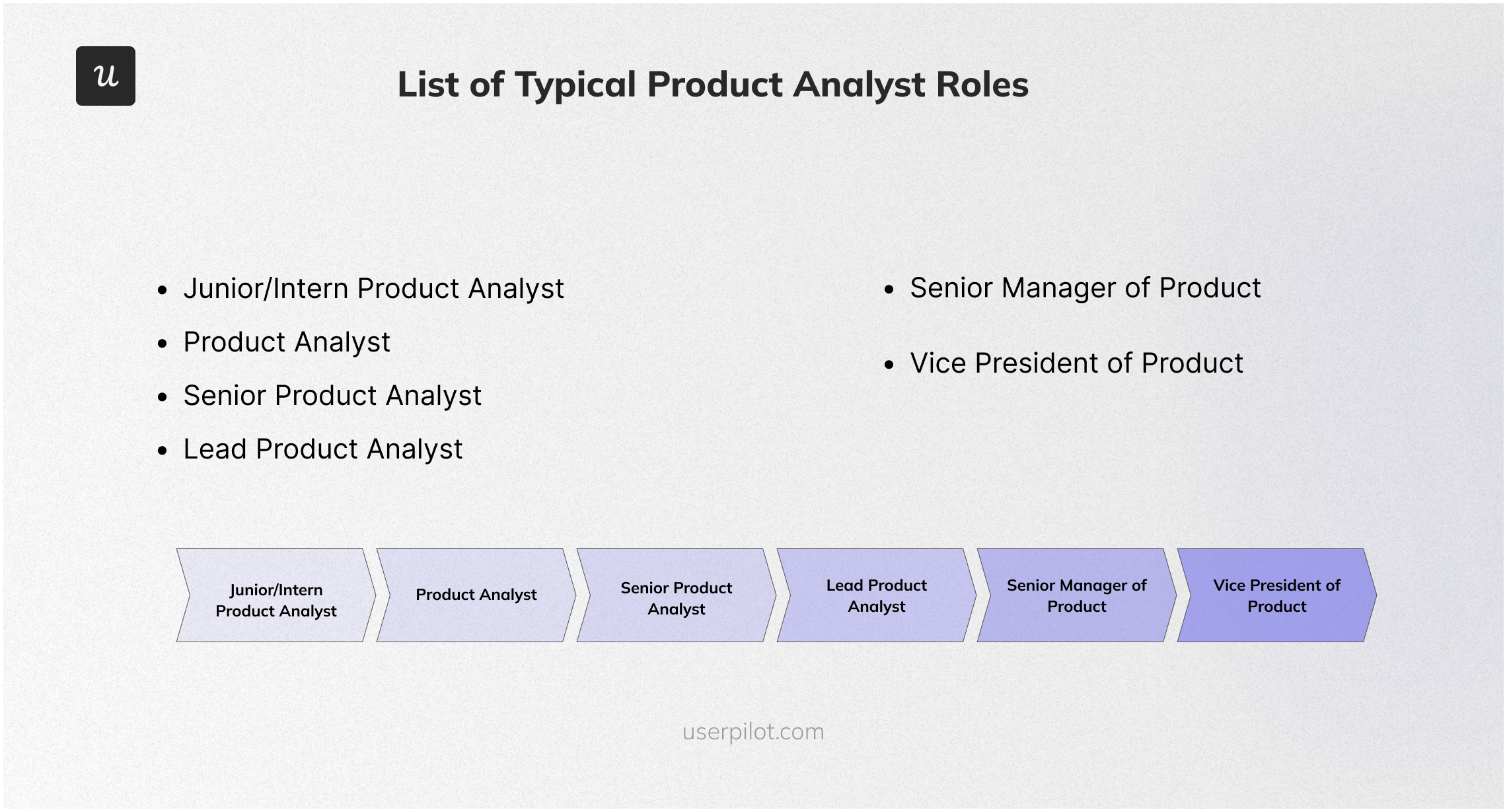![Product Analyst Salary [+ Resources to Advance]](https://blog-static.userpilot.com/blog/wp-content/uploads/2024/06/Product-Analyst-SalaryResources-to-Advance-450x295.png)
How much does a product analyst make?
According to Glassdoor, the estimated total pay for a Product Analyst is $100,309 per year in the United States, with an average salary of $82,487 per year. There is an estimated additional pay of $17,821, depending on your position and where you are working.
One of the most important determinants of your salary is your level of experience.
To give you a more accurate insight, here is a breakdown:
- 0-1 years: $68K – $104K/year
- 1-3 years: $75K – $114K/year
- 4-6years: $82K – $131K/year
- 7-9 years: $87K – $143K/year
- 10-14 years: $97K – $161K/year
- 15+ years: $107K – $185K/year
Different industry sectors have different salary ranges, and the industries with the highest demand pay the highest. The top 3 paying industries are media and communication, information and technology, and pharmaceutical and biotechnology.
- Media and communication: $107,267/year
- Information Technology: $101,915/year
- Pharmaceutical and Biotechnology: $100,743/year
With the remote work structure, it is not uncommon to find companies offering location-based salaries. Here are the midpoint salaries for the following large cities in the United States, according to Glassdoor:
- San Francisco: $106,208/year
- New York: $93,239/year
- Boston: $85,844/year
- Washington: $91,928/year
- Chicago: $83,134/year
Try Userpilot Now
See Why 1,000+ Teams Choose Userpilot

Product analyst career path
The product analysis career path starts with the entry-level role of a junior or intern product analyst, which proceeds to Lead product analyst and goes as high as the Vice president of Product role. Here is the typical career path of a product analyst:
- Junior/Intern product analyst: The junior product analyst role is entry-level, where you get hands-on experience in product analysis. You are assigned tasks, and you assist senior product analysts in user analysis and product research, among other functions. You also learn how to use product research tools.
- Product analyst: When you gain more experience and show competence in your junior analyst role, you are promoted to product analyst. In this role, you perform functions like analyzing data, extracting insights, and preparing reports.
- Senior product analyst: A senior product analyst develops actionable insights and strategies based on the research and analysis results.
- Lead Product Analyst: A lead product manager leads the product analysis efforts and monitors the research, analysis, reporting, and strategy development.
- Senior Manager of Product: A senior manager of a product works closely with other product professionals, like product managers, to develop and implement product strategies obtained from product analysis.
- Vice President of Product: This is the highest role in the product analysis career, where you oversee all matters related to product analysis, development, and product lifecycle.
Best practices to be a great product analyst
Here are the top five best practices for being a great product analyst:
- Setting SMART goals and KPIs: The product analyst role ranges from research, analysis and interfacing with other product professionals and stakeholders effectively. This creates the need to set goals that are specific, measurable, achievable, relevant, and time-bound to keep you in line and help you monitor your performance.
- Attention to detail: A product analyst must be able to spot a product trend by paying attention to details.
- User-centric mindset: A product analyst puts themselves in the shoes of the user in every stage of the product lifecycle.
- Ability to incorporate customer feedback: Incorporating customer feedback makes you develop and make appropriate iterations to your product for better customer retention.
- Getting skilled with product analysis tools: Getting proficient in product analysis tools like Userpilot is one factor that can give you an advantage and provide you with more accurate and specific insights.
Best resources for product analysts
There are insightful resources on the internet on product analysis ranging from books to webinars to podcasts to blogs. Here is a compilation of the best resources for product analysis:
Best books for product analysts
- Product Analytics: Applied Data Science Techniques for Actionable Consumer Insights by Joanne Rodrigues-Craig: In the book, Joanne explained in detail how to gain customer insights through data. It’s a book anyone looking to get into product analysis should read.
- Lean Analytics: Use Data to Build a Better Startup Faster by Alistair Croll & Benjamin Yoskovitz: The book explains how to leverage data to build your business and contains over 30 case studies based on real-world scenarios and interviews with founders and investors.
- Now You See It: An Introduction to Visual Data Sensemaking by Stephen Few: The book explains data visualization extensively, including how to analyze and interpret data and also present them to stakeholders.
Best webinars for product analysts
Here’s a curated list of top webinar sources packed with valuable content for product analysts covering various areas of expertise:
- Userpilot hosts webinars on product management topics where data analysis plays a crucial role. Look for webinars on user research, product metrics, and data-driven decision-making.
- Product Alliance is a product management community that occasionally hosts webinars on using data to inform product decisions. These webinars can help product analysts understand how their work impacts the product roadmap.
- DataCamp offers free and paid webinars on various data analysis topics, including SQL queries, data manipulation in Python or R, and data visualization best practices.
- Tableau frequently hosts webinars on data visualization using their popular software. You can also find webinars on broader data analysis topics.
Best blogs for product analysts
- Userpilot: The Userpilot blog covers different topics on product analysis in-depth.
- Product Talk: Product Talk is a blog resource for every individual in product, including product analysts, product managers, and product marketers.
- IBM Big Data and Analytics Blog: The IBM Big Data and Analytics Blog is where you get to read from thought leaders in the data analytics world.
Best podcasts for product analysts
- RAMP By InsightSquared: The podcast by InsightSquared provides insight on how to scale your SaaS using analytics.
- Best Podcast for Data Visualization: Data Stories: The podcast focuses on data visualization and features real-world scenarios.
- The Product Podcast: The product podcast speaks to product professionals and covers topics ranging from interviews with top product individuals to career advice for people looking to get into the product world.
Best tools for product analysts
- Best tool for Product Analysis (Userpilot): Userpilot gives you insight into your product performance and helps you understand user behavior.
- Best tool for Product Insights (Mixpanel): Mixpanel helps you understand your customer experience and find out what works and what does not.
- Best tool for Business Intelligence (Tableau): Tableau is a business intelligence tool that helps you transform your data into insights you can easily present to stakeholders.
- Best tool for Data streamlining and presentation (Power BI): With Power BI, you can connect data from different sources and analyze and visualize them for easy data reporting.
- Best tool for Data Visualization (Google Charts): Google Charts provides a variety of chart and graph types for top-notch data visualization, making your presentation detailed and insightful.
Conclusion
Now that you have a better understanding of the salary range for a product analyst position, you can take steps to improve your earning potential. Consider pursuing relevant certifications, developing your skillset, or negotiating effectively during the job offer stage.
Looking into tools for product analysts? Userpilot is an all-in-one product platform with engagement features and powerful analytics capabilities. Book a demo to see it in action!









